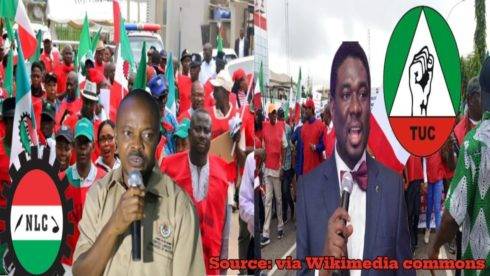Organised Labour in Nigeria has declared a nationwide indefinite strike, set to take effect at midnight on Sunday, June 2, 2024. The strike is a consequence of failed negotiations between Labour and the government regarding a new national minimum wage. Despite exhaustive efforts to resolve the impasse, no fruitful results were achieved, leading to the decision to down tools.
The strike is expected to have a profound impact on economic activities across the country, with workers from various sectors, including healthcare, education, and transportation, set to participate. The indefinite strike is a clear indication of the frustration and disappointment of Nigerian workers, who have been seeking a review of the minimum wage for an extended period. The strike may lead to a paralysis of economic activities, highlighting the urgency for a resolution to the impasse.
Organised Labour: Strike to Commence on Monday, June 3, 2024
The nationwide indefinite strike is set to commence at 1 a.m. on Monday, June 3, 2024, with workers expected to stay away from their duty posts until further notice. This move is a last resort for Organized Labour, which has been engaging with the government to secure a new national minimum wage. The strike will affect all sectors of the economy, including government offices, schools, hospitals, and private businesses, highlighting the urgency for a resolution.
The failure of negotiations has left workers with no choice but to down tools and demand fair compensation for their services. The strike is a clear indication of the determination of Nigerian workers to fight for their rights. With the strike set to affect all sectors of the economy, the government is urged to intervene and resolve the impasse to avoid further disruption to economic activities. The strike is a call to action for the government to prioritize the welfare of workers and address the long-standing issue of a new national minimum wage.
Organised Labour: Failed Negotiations Lead to Strike Action
The decision to embark on a nationwide strike was reached after negotiations between Organised Labour and the government broke down. Despite efforts to reach a compromise, the two parties failed to agree on a new national minimum wage, leading to widespread frustration among workers. The impasse has highlighted the government’s inability to meet the demands of workers, who feel their concerns are being ignored.
The failed negotiations have raised concerns about the government’s commitment to improving the welfare of workers. Organized Labour has accused the government of not taking their demands seriously, leading to the current stalemate. The strike is a clear indication of the frustration and disappointment among workers, who feel that their demands are being neglected. The government’s inability to resolve the impasse has led to a breakdown in trust, highlighting the need for urgent action to address the welfare of workers.
Organised Labour: Workers Demand Fair Compensation
Workers in Nigeria are demanding fair compensation for their services, citing the current economic realities in the country. With inflation and economic hardship on the rise, the demand for a new national minimum wage is seen as a way to cushion the effects on workers. The strike is a clear indication of the determination of Nigerian workers to fight for their rights and ensure a decent standard of living.
Organised Labour has vowed to continue the strike until their demands are met, insisting that workers deserve fair compensation for their services. The strike is a last resort for workers who have seen their purchasing power dwindling due to the eroding value of their salaries. With the strike set to continue until a resolution is reached, the government is urged to intervene and address the demands of workers to avoid further disruption to economic activities.
Economic Activities to be Affected
The nationwide indefinite strike is expected to have far-reaching consequences on economic activities in Nigeria, affecting the productivity of various sectors, including healthcare, education, and transportation. The strike is likely to lead to a significant decline in economic output, as workers across various industries down tools. This could have a ripple effect on the entire economy, leading to a slowdown in economic growth and development.
The strike may also lead to a shortage of essential services, including healthcare and emergency services, which could have severe consequences for the well-being of citizens. The government has been urged to intervene and resolve the impasse to avoid further disruption to economic activities. Urgent action is needed to address the demands of workers and resolve the crisis, ensuring the continued functioning of essential services and mitigating the impact on the economy.
Government Urged to Intervene
Table of Contents
Discover more from OGM News NG
Subscribe to get the latest posts sent to your email.














